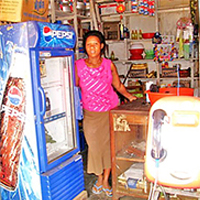Meet Our Borrowers
Naomi is married with seven children. She used her WMI loan to do something unusual: she bought water to irrigate her small garden of tomato and onion plants...
She lives in the drought prone village of Ntumburi in the Laikipia Plateau area of central Kenya. By watering the seedlings regularly they matured in record time and she started a "pick your own" produce business so that she would not have to provide the labor for harvesting. By rotating when the seedlings are planted, she ensures that some produce is always ripe and ready for picking. She transports the water to her garden by jerry cans, filling them up at a watering station a half mile down the road.
Her business is very profitable. Within the first 6 months, she was able to pay all the boarding school fees for her 3 children still in school (about $900), install a small home solar lighting system and even purchase a used television. Naome is saving regularly out of her profit to buy a water storage tank and pipes so that she can connect her home directly to the local water station.
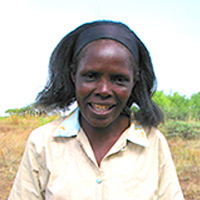
Naome Kanenu
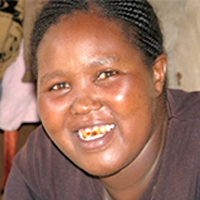
Pamela Naitetoi Kilua
31 years old, Pamela is the Head Administrator for the WMI loan hub in Ngerendare, Kenya. She "grew up as a Maasai girl looking after goats before going to school and on weekends after joining school."
She gave this inspirational speech to the loan hub's first group of borrowers:
"Sometimes they call us women the same word that they use for donkey. We are seen as work animals. A woman's life can be so miserable. You are expected only to have children and keep the animals... Your husband hardly allows you to leave the compound. You know life to only be hard work and no reward. I saw my mother live like a slave and my older sisters and I knew I would never allow myself to be put in that position.
I did marry a Maasai man and I have children, but my husband is educated and we work together to support our home and family. I started going house to house telling women that if our lives were going to improve it would not happen one by one, that instead we had to be united. I taught them beading.
Even if their husbands wouldn't let them out of the house they could take their beading with them to tend the animals or while watching the children. We created a small collective and sold our work to a tourist lodge. This was good but it could only help a small number of women. I wanted to help more of the women in the area. I wanted to see them able at least to buy one clean nice skirt for themselves. I wanted to see them exposed to new ideas and other ways of living. I wanted them to gain some self-confidence and respect.
When I see women coming to the trainings, getting knowledge, participating and laughing, I feel happy. WMI is the first program to give loans but also to provide training. This is the first time these women have ever heard that we have to save our money in order to work our way out of poverty. Our parents before us did not save anything, but now we are saving with our children in mind. We are saving because we want to see our children have better lives than we do.
At first many husbands did not want their wives to join the group to get loans. They are afraid to let their women have any independence because they know if they are given the opportunity the women might perform better than the men. But now many husbands are regretting because they see the families of the WMI borrowers doing well. They are paying school fees and dressing smart. They are able to eat better and even improve the home.
WMI women are proud of their businesses and the extra money they are bringing to their families. There is more cooperation in the home. I am determined to run this loan hub very well so that more and more women can be empowered and more and more families can work their way out of poverty."
Kamida's story starts in 2000, when she ran a café in the Uganda/Kenya border town of Busia, where her husband is from. However, business in Busia was a failure... Being a foreigner to the town, she was alienated by the community and the competition went to great efforts to stop her from taking their customers. Eventually she was forced to close.
When WMI came in she saw it as her chance to start over again. Kamida confronted her fears of the possibility of failing another time and applied for a loan to start a new café. Fortunately Kamida's efforts have paid off. The new location and her will to succeed has proved well for attracting customers. Today she is able to save up to ten thousand shillings a day now, where before she had never saved any money.
Kamida is happy to say that her family is doing much better now. The children are clothed and able to go to school. During holidays they even help her out in the café and learn the skills of the business. Kamida's confidence and capabilities have grown tremendously and she had endless plans for expanding her business and improving things at home.
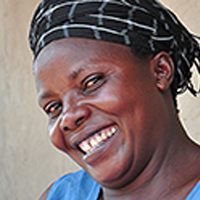
Kamida Wosuki
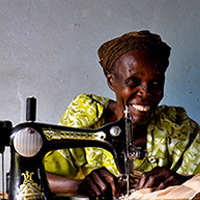
Jackline Nagudi
Jackline, 32 when she got her loan, tells her own story: "Before I joined this women's group I was selling banana and passion fruit juices. My business was moving at a slow pace. Customers were reluctant to buy my drinks because of the myths about juice making methods, which people were afraid were unhygienic.... This was definitely bad for my business. I desperately wanted money to start a better and safer business, but I didn't know where to access it. WMI came to my rescue. I managed to get a loan, and I invested the money in soda. I can now buy about 20 crates of soda to sell at a price that gives me profits. In a week I sell about 10 crates, which is really good for my family and me. We are happy and feel rich. I have also invested some of my money in raising turkeys."
Namono is strong, motivated, and a true business woman. When the rain starts to pour at a group meeting it is she who is suddenly there with a bag of second hand jackets, ready to capitalize on the turn in events and collect those extra shillings that go a long way...
In 1996 Namono became a widow, her husband becoming yet another victim of Aids. For years she struggled to support herself and five children on the small coffee plantation left by her husband, until she was eventually forced to begin selling second hand clothing as well to make ends meet.
With the introduction of WMI, Namono took out a much needed 300,000 shilling loan to expand her second hand clothing business to the productive enterprise it is today. Currently all her children are able to go to school, and she even has enough left over to enjoy little luxuries, like milk for tea, which was beyond their reach before.
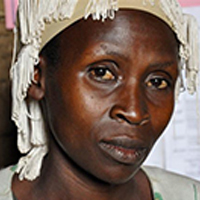
Namono Lakeri
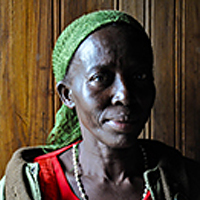
Guttu Hendrick
Guttu truly glows despite losing her husband to AIDS in 1995 and having a debilitating stroke in her left leg only a few years later. Unable to come up with enough capital to make her clothing business a success, she turned to WMI... She is managing to still raise her five healthy children and pay the fees to send them all to school.
Unfortunately, however, this had not always been the case. Originally a teacher, after the loss of her husband Guttu realized that her salary was not enough to provide for all the daily fees and family needs.Any extra expense, like a pencil for school, was a luxury that could not be afforded.
In January 2007 Guttu began a retail clothing business to try and cover family costs, but was unable to come up with enough capital to really make any success of it. A WMI loan of 300,000 shillings ($150) therefore proved to be the hidden gem. With the loan she was suddenly able to buy enough stock to make a profit and send her children to school. She has also learned important skills like saving; something that she is now doing for the first time in her life. Guttu believes that her family would not be where it is today without the serious planning that enabled her to save and improve upon daily struggles.
With the left side of her body disabled from her stoke, Guttu is not always fit to run her shop so she has had to teach her son how to run the business for the survival of her family. From his early experiences in the shop, her son now strives to take after his mother and start his own business one day.
Guttu would like to tell the "mamas in America" that their loan money has enabled her to plan, save, and run an invaluable business. She wants to assure them that the mama's here are ready to continue working to pay back their loans for the wellbeing of their families. Their hardworking nature would not allow otherwise.
Napir was born in 1975 in the neighboring village of Sendui, but after marrying her husband she now lives in Alailelai, Tanzania. About two years before WMI came to Alailelai, Napir was already taking an active role in her family's finances with a business of selling maize, sugar, and candy. She sustained many setbacks and struggled to make any profit for her family. Her main problem was lack of capital to purchase inventory...
Since joining the loan program and receiving her first loan in January 2012, Napir is proud that her business has grown successfully. Napir has always stood out as a motivated activist, which gave rise to her position as leader of Alailelai's blue loan group. A wide, beaming smile spreads across her face whenever she explains that she is making a lot more money from her business than before. Using her loan money from WMI, Napir added onions, tomatoes, rice, salt, cough medicine, and clothes to her list of products. She is also able to buy her own goats with the money she's earned, an investment that serves as savings.
Napir thinks the Maasi community as a whole, along with her own life specifically, has been positively impacted by WMI's work. She has dreams of owning her own store in future years, a dream she says would be impossible without WMI's guidance. Her profit goes towards buying soap and clothing for her children, a trend she explains is consistent among women in the program who no longer depend on their husbands for food, clothes, or even school fees for their children.
With the freedom to spend their money as they choose, Napir says women are now able to help their relatives financially. She also notices women are better dressed and in general, they are more independent and powerful within their family dynamics. Napir is happy to be seeing the effects of female empowerment in many different aspects of her community.
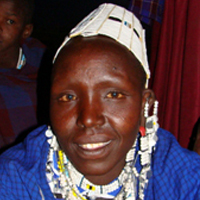
Napir Me Pukori
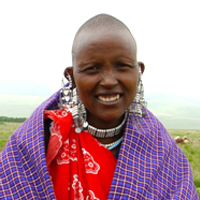
Nemburis Empapa
Nemburis was born in 1972 and moved to Alailelai when she married her husband Empapa at the age of 18. She is one of Empapa's five wives. As one of eight siblings, she walked two-hours each way to the primary school in Alailelai in order to obtain an education. She was grateful that her family allowed their daughter to attend school, as many Maasi families do not see the value in educating women... Although she did not graduate, she was one of the few children in her family to receive any primary schooling. Nemburis has seven children, five are in primary school, with two attending secondary school.
Nemburis' business consists of selling sugar, tea, goats, and strings of beads for other women to do beadwork. While she had her business for six years prior to joining the loan program in January 2012, she feels that WMI has made a huge difference in her ability to provide for her family. Not only does her increased profit allow her to afford her children's school fees, but when her child was very sick she was able to send him to the hospital.
While Maasi husbands and wives often keep their money separate, Nemburis and her husband both contributed to covering their son's medical expenses - a major source of pride and empowerment for Nemburis as a mother. Her son's illness put some financial strain on her recently, but she is saving money from her business profits, with the plan of building a small house for her family.
Nemburis takes advantage of every opportunity that WMI has offered her and sees a positive impact on the entire community. Nemburis is seeing her life improve steadily as a result of her involvement with the loan program: since receiving her first loan she bought, and now personally owns, four sheep and one donkey. Nemburis hopes that her business will continue to grow; she is very grateful for her current success.
Rebecca Namataka lives in the village of Kaama in Eastern Uganda, where she was born and raised. A wife and mother of 6, Rebecca had her own tailoring business for 14 years before she joined WMI to learn recordkeeping and acquire better marketing skills.
With her first loan, Rebecca began buying additional materials and new fabrics to create original clothes. The loans allowed her to increase her outputs because she now has necessary supplies and inventory on hand. She has been able to delegate tasks to her oldest daughter, who is training to become a tailor - her daughter works at their home shop in the village while Rebecca goes to sell at the marketplace.
Since receiving her first loan, Rebecca has improved her recordkeeping and is now creating detailed, long- range budgets. She can pay her children's school fees by putting money away each month. Her savings have also helped ensure her family can deal with unexpected costs and medical treatments. This greater financial stability has positively impacted Rebecca's marriage. She is now able to buy goods for herself, her children, and her home without having to ask permission from her husband.
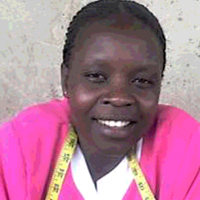
Rebecca Namataka
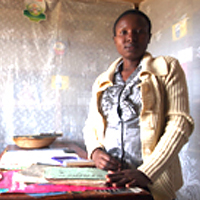
Sylvia Namono
Sylvia 30, is a driven and resolute young woman running a drug shop in the Buyobo Trading Centre in Uganda. Trained as a nurse... Sylvia worked at a health clinic in Buyobo but was not receiving a salary. Determined to improve her financial situation, she received her first loan from WMI in 2011, which she used to buy her drug shop. Her first loan with WMI was 100,000 shillings (about $37). As her business expanded, she has taken larger loans and now has graduated to a bank loan of 1,000,000 shillings (abut $400).
She is adamant that the loan program has changed her life and the lives of her husband and three children, saying, "This loan has really changed me, health-wise, economic-wise. If I fall sick, if my children fall sick, I am able to get treatment. I am able to buy food." She has set the impressive goal for herself of one day opening up her own health clinic where she can admit and treat patients. Her passion lies in providing accessible health care to the community.
Jane, 44, runs a business selling fresh produce in a small village in Uganda. She received her first loan from WMI in 2008... and has since worked hard to expand her business and become more financially stable. As a mother of 4 children and grandmother to one child, the loan program has helped her tremendously to provide better food and healthcare for her family. She is proud of the improvements she has been able to make in her life because of the WMI program, saying, "I am now able to get all the necessities I need from my business profits." Jane is now able to stand on her own and can even pay all school fees for her children by herself.
Her first loan with WMI was 300,000 UGX (about 115 USD), but she is now an independent banker with Post Bank and has a loan of 1 million UGX (about 400 USD). She is using this loan to add to her business and hopes that one day she can build a permanent house for her family. She appreciates the program because it has helped many people.
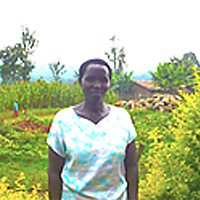
Jane Woboya
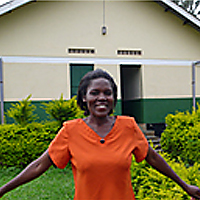
Agnes Wodada
Agnes, 44, is a busy and ambitious woman. In addition to being a math and science teacher at Buyobo Primary School in Uganda, she also works as a local coordinator for some loan groups and successfully runs a tomato business... Her business has grown steadily since receiving her initial loan of 100,000 shillings in 2009, as she took out increasingly larger loans with WMI and eventually graduated to independent banking with Post Bank where she now has a loan of 1 million shillings.
Since her participation in the loan program, she has drastically increased her own skill set in business saying, "I was among the first women to be trained and up until today these skills have allowed me to manage my business and take care of my family." Her participation in the loan program has enabled her to provide better education for her 4 children, who attend school in Mbale and near Kampala. Her better standard of living has allowed her to help others as she has taken in and looks after three children from her extended family.
Agnes has a bright future ahead of her. She is now in the process of constructing a shop at Buyobo Trading Centre which will allow her to expand her business further. She hopes that in five years she will be financially stable enough to no longer require a loan, adding "I will stand be able to stand on my own."
Fareeda, 38 years old, lives in Buloli A village, in rural Bududa Township in Northeastern Uganda. She was eking out a meager living by making and selling charcoal - a difficult and dirty business. Collecting and burning the wood is time- consuming; the smoke is toxic and coats everything around it in a powdery black dust. When Fareeda got her WMI loan in 2011 she bought an inventory of shoes. These brightly colored plastic slides are worn all over the country. She sells at least 20 - 30 pairs a month; but during the holidays or when school terms begin she sells many more. With her profit she has purchased chickens and a goat and greatly improved the number and quality of meals for her children.
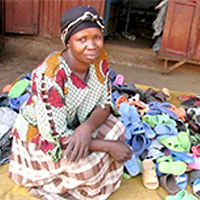
Fareeda Mahyali
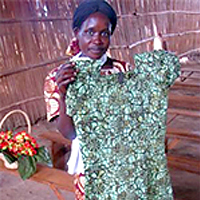
Anna Apio
Anna got her first WMI loan in 2011 and with it bought a bundle of used clothes, which she sold quickly. She then used the profit to buy a sewing machine and began making clothes on order for customers. Very soon thereafter her husband was in an accident and broke his thighbone. He could no longer work, and she became the sole support of her family, which includes 3 small children.
Anna began making school uniforms and obtained contracts for aprons. She paid for her husband's medical bills and all of the family expenses out of her profits. Anna estimated that the supplies for a ladies' dress cost about $7 and it takes her about 3 hours to complete. She sells each dress for $12- $15. Her husband has just now started working again.
He is from the far western part of the country near the Congo border, so his relatives were too far away to help when he was ill; but now that he is traveling again, he scouts out different fabrics and materials for her to use in her own dress designs.
They are planning on adding only one more child to their family, and she is hoping for a girl so she will have 2 of each! Anna was very frank in explaining that without the WMI loan and her tailoring business, she does not know how she would have supported her family during her husband's illness.
Olivia is 39 and has 3 children aged 7, 12, and 17. She said she is not having any more children because she is too busy with her business!
She runs a well-stocked, double-wide shop and small café, selling everything from, soda, beer, snacks, airtime, batteries and pens to laundry detergent. Soda and beer sell very quickly in the hot dry months of December - March. One crate of soda costs her about $6 for 24 bottles and she sells the crate for $10. These days she sells about 3 crates/day, making a profit of about $12/day on soda alone. The daily profit on beer adds another $5/day.
She was proud to report that each and every day she saves $2 in a small box. She was also proud to report that she uses her profit to pay school fees for the children, all of who are doing quite well. Betty, Jackline and Irene enjoyed one of Olivia's sodas on the house.
